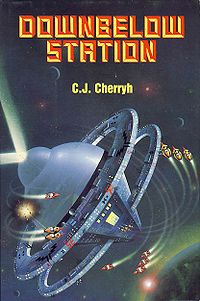Downbelow Station was published in 1981 and won the Hugo in 1982. It is in many ways the central book of the Union-Alliance series. It’s about the Company Wars. Most of the books in the series are dealing with the aftermath of those wars, flotsam and jetsam left in their wake. Downbelow Station is central, it has many points of view (many of them important people), and it’s about the end of the war and the formation of the Alliance. It has a marvellous perspective on humanity in the wider universe. I have to admit, though, it’s a hard book to like.
There’s a story that after Cherryh had written this book, someone told her every scene had to do three things (any three things), so she went through and removed all the scenes that only did one or two, without replacing them with anything. I don’t suppose for a moment that this really happened, but it’s one of those legends that’s truer than the facts. Downbelow Station is a dense, complex book written in a terse, futuristic style, from multiple points of view, some of them alien and many of them unpleasant. It feels disorienting and slightly disconnected and as if something somewhere has been left out. It’s definitely immersive, and the history is real enough to bite, but even on a re-read it isn’t a book I can sink into. I bounced off it the first time I tried to read it, and even now it’s my least favourite and the one I only read when I’m doing a full re-read of the whole series. Again, I don’t think this is a good place to start. (Coming soon: a post on some places I do think would be good to start!)
All of Cherryh’s characters are ambiguous, but nowhere more than here, where there are so many of them. The plot is a complex maneuvering of factions and realignment of interests. There are space battles, and there are economics of space stations. There’s a compelling beginning where a warship turns up with freighters full of desperate refugees that have to be accommodated at the space station without warning. And there are all these factions and points of view.
The Mazianni are a Company fleet that have been fighting too long. They’re exhausted, hard as nails, and can’t stop. Signy Mallory, one of their captains, is ruthless, competent, deadly… and really not very nice.
The Konstantins are nice. They run Pell, a space station circling an alien planet and clinging to its independence at a time when Earth is giving up space to Union, seen here as unmitigatedly terrifying and appalling. They’re definitely nice, all of them—we get three Konstantin points of view, Angelo, Emelio and Damon—but their very niceness is their fatal flaw, their hamatia which causes their tragic downfall—except not quite, because the novel is a eucatastrophe, not a tragedy.
Elene Quen is a merchanter who is married to Damon Konstantin and staying on Pell for a while when she learns that her own ship, and family, have all been killed.
Josh Talley is a Union spy who after his brainwipe becomes something very interesting but also very ambivalent.
Satin is a hisa, an alien from Downbelow. The alien point of view is convincingly alien, but the hisa are, regrettably, furry noble savages. Cherryh has done much better aliens absolutely everywhere else she has aliens. I find the hisa embarrassing with their pidgin English and their names “Sky sees her” and “Bigfellow” and “Sun her friend.” Cherryh could do better than this—she did, the year before, with Pride of Chanur.
Ayres is a Company man, come from Earth to sell out the Mazianni and all of space. He starts off seeming deeply unsympathetic, but by the time Union have been horrible to him for most of the book, I feel terribly sorry for him.
Jon Lukas is a resident of Pell who tries to play both sides against the middle. He’s hard-headed, self-interested and very unpleasant, but that doesn’t mean he’s always wrong.
Vassily Kressich is a resident of Q, the Quarantine Zone where the refugees lead lives of riot and gangs, and who is so desperate he’s the pawn of anyone who uses him.
I used the word “desperate” several times, and I could have used it several more if I were talking about what happens to these people as the book goes on. It’s a novel about desperate people, desperate spacestations, desperate aliens, a desperate spacefleet that’s out of choices. It’s desperately claustrophobic too, with people hiding in tunnels filled with unbreathable air, not to mention that the whole of Pell is an inescapable trap. It’s marvellous that Cherryh manages to pull a happy ending out of all that.
That said, Downbelow Station is a book I only re-read because I’m in love with the universe, kind of the way one puts up with one’s spouse’s irritating relations.










